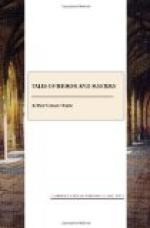In some subtle way he divined the sympathy which I had for him, and he showed in his own silent fashion that he appreciated it. He even invited me once to share his afternoon walk, and although no word passed between us on this occasion, it was a mark of confidence which he had never shown to anyone before. He asked me also to index his library (it was one of the best private libraries in England), and I spent many hours in the evening in his presence, if not in his society, he reading at his desk and I sitting in a recess by the window reducing to order the chaos which existed among his books. In spite of these close relations I was never again asked to enter the chamber in the turret.
And then came my revulsion of feeling. A single incident changed all my sympathy to loathing, and made me realize that my employer still remained all that he had ever been, with the additional vice of hypocrisy. What happened was as follows.
One evening Miss Witherton had gone down to Broadway, the neighbouring village, to sing at a concert for some charity, and I, according to my promise, had walked over to escort her back. The drive sweeps round under the eastern turret, and I observed as I passed that the light was lit in the circular room. It was a summer evening, and the window, which was a little higher than our heads, was open. We were, as it happened, engrossed in our own conversation at the moment and we had paused upon the lawn which skirts the old turret, when suddenly something broke in upon our talk and turned our thoughts away from our own affairs.
It was a voice—the voice undoubtedly of a woman. It was low— so low that it was only in that still night air that we could have heard it, but, hushed as it was, there was no mistaking its feminine timbre. It spoke hurriedly, gaspingly for a few sentences, and then was silent—a piteous, breathless, imploring sort of voice. Miss Witherton and I stood for an instant staring at each other. Then we walked quickly in the direction of the hall-door.
“It came through the window,” I said.
“We must not play the part of eavesdroppers,” she answered. “We must forget that we have ever heard it.”
There was an absence of surprise in her manner which suggested a new idea to me.
“You have heard it before,” I cried.
“I could not help it. My own room is higher up on the same turret. It has happened frequently.”
“Who can the woman be?”
“I have no idea. I had rather not discuss it.”
Her voice was enough to show me what she thought. But granting that our employer led a double and dubious life, who could she be, this mysterious woman who kept him company in the old tower? I knew from my own inspection how bleak and bare a room it was. She certainly did not live there. But in that case where did she come from? It could not be anyone of the household. They were all under the vigilant eyes of Mrs. Stevens. The visitor must come from without. But how?




